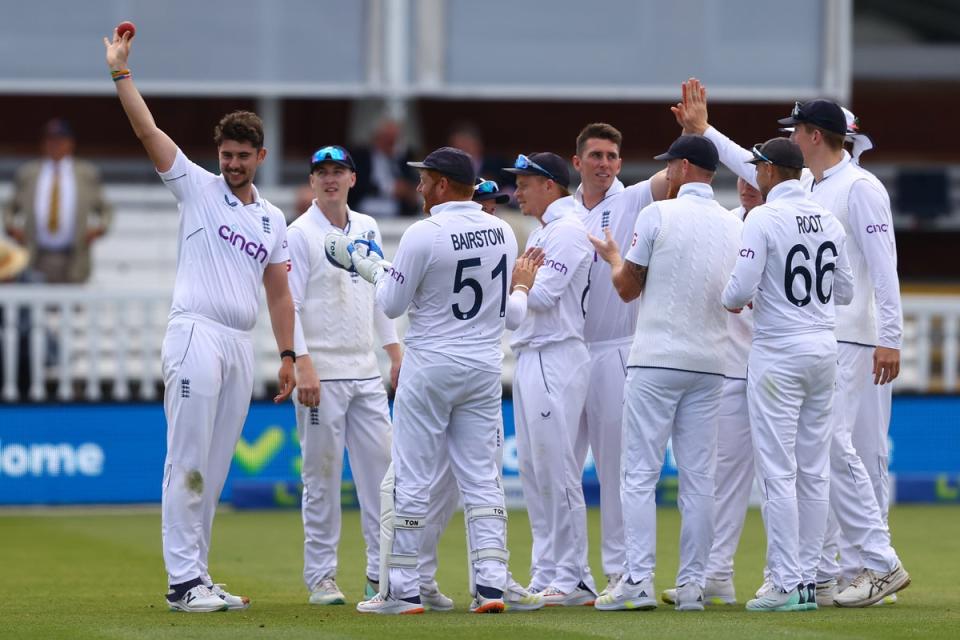England may have unearthed a gem in Josh Tongue - but must be more clinical in Ashes

England will hope they have unearthed a gem in Josh Tongue, who secured a place on the Lord’s honours board on debut.
A tall figure at 6 foot 4, Tongue brings a new depth to England’s pace attack, with an extra lick to set him apart from the likes of James Anderson, Stuart Broad and Ollie Robinson.
Preferred to Chris Woakes, Tongue has earned a longer opportunity to impress, after performing well in his first ever game at the home of cricket, taking five for 66 in the second innings, as England won by 10 wickets.
The Worcestershire paceman had bowled just once in the nets before being given the nod by Brendon McCullum for his debut and was named in England’s 16-strong squad for the first two Ashes Tests on Saturday.
In the afternoon on the second day, Tongue struck immediately after replacing Broad, claiming the wickets of Peter Moor and Andrew Balbirnie. Paul Stirling then became Tongue’s third Test scalp, with the fourth coming when Harry Tector was bowled just after bringing up his half century. After England were made to work in the field, Tongue claimed the eighth wicket of Fionn Hand, before holding the ball aloft to the applause of the crowd.
He finished as the pick of the bowlers, despite looking significantly more threatening when he was pitching it up rather than bowling short, as he did throughout the first innings to little effect, but Ben Stokes was full of praise for the squad’s latest addition.
“To have someone like him come into the squad and have the ability that he has in terms of the pace he offers,” Stokes said.
“I told him the role that I saw him playing in this team as our third seamer and used him in a way to get different types of spells out of one bowler.”
There will be the inescapable feeling that England eased off when trying to take the final wickets and bowl out Ireland on day three. There was a touch of sloppy fielding, including some overthrows easily given away and wayward bowling that will have to be addressed ahead of the clash with the Australians at Edgbaston on 16 June.

Ireland also showed a resistance that should boost their confidence in the red ball format after a dismal first innings. Tector, Mark Adair, and Andy McBrine brought up half centuries, with McBrine finishing unbeaten on 86, when England claimed the final wicket.
The duo of McBrine and Adair put on Ireland’s highest ever partnership in Tests (162 runs), for the seventh wicket. Ireland were already a player down after James McCollum retired hurt with a serious ankle injury on the second day, but England were made to toil in the afternoon.
Adair’s 88 took the game into the second session, but he was caught behind off Matthew Potts, and agonisingly denied what would have been a memorable first Test century. It was a shame in a way that Ireland could not conduct their first innings in the same fashion as the second or those watching might have been bemoaning a lack of a fifth day rather than a game all wrapped up in just three.
Ireland had all but achieved the impossible when they scored 362, enough to make England bat again, but it was all over in just four balls, with Zak Crawley finding three boundaries inside the first over of the fourth innings.
Ben Stokes caused England fans a moment of worry in the afternoon. There was a sharp intake of breath as he took the catch for Ireland’s sixth wicket.
The England captain appeared to wobble slightly on his often-problematic left knee and will be hoping it isn’t a sign of anything serious, but he looked uncomfortable for the rest of the match, especially when diving around in the field.

 Yahoo Sports
Yahoo Sports 